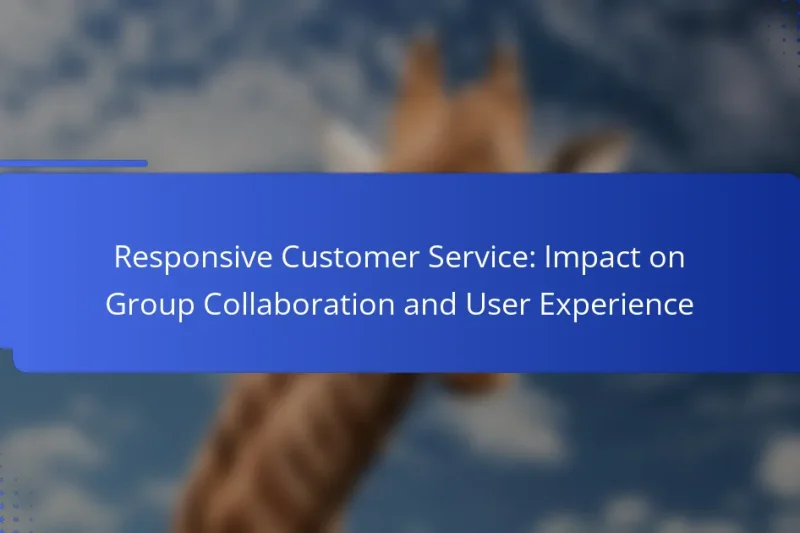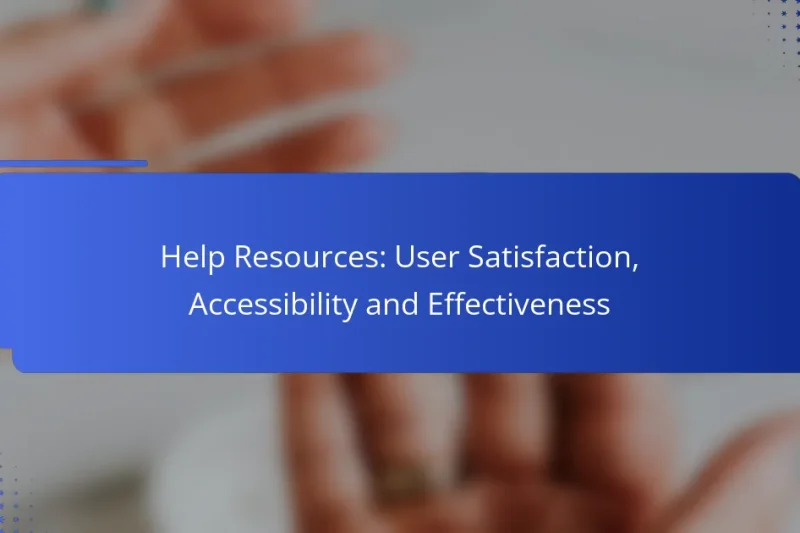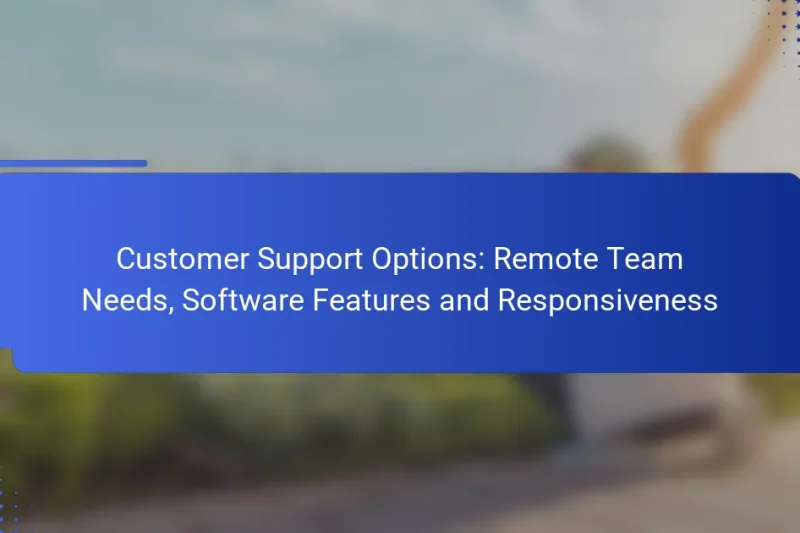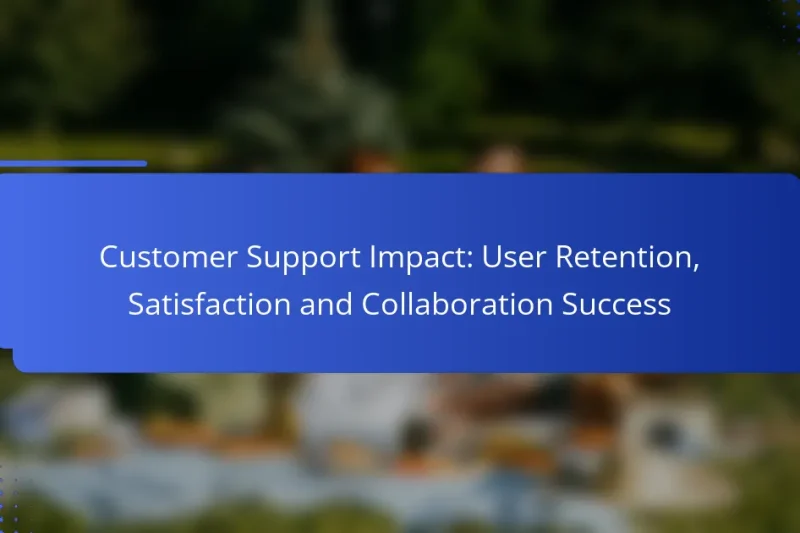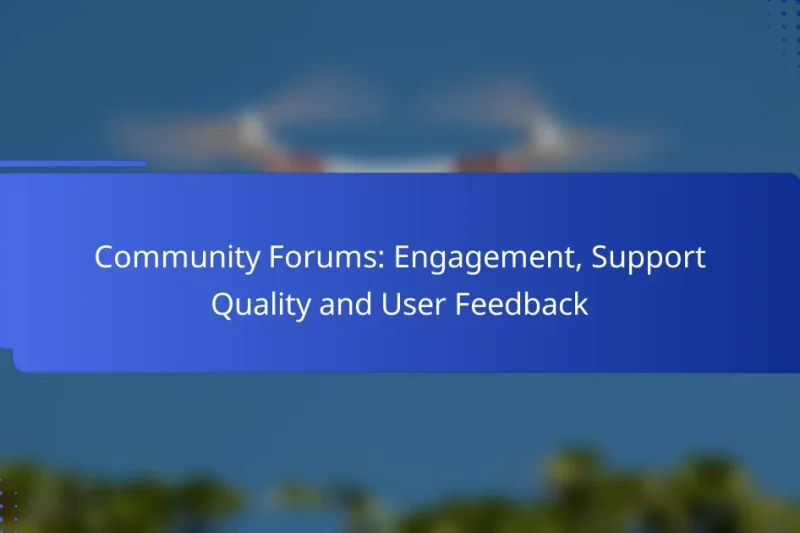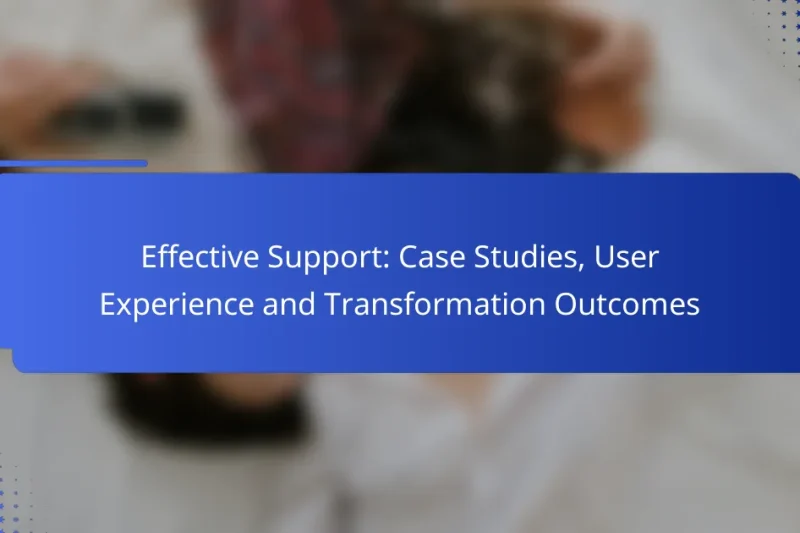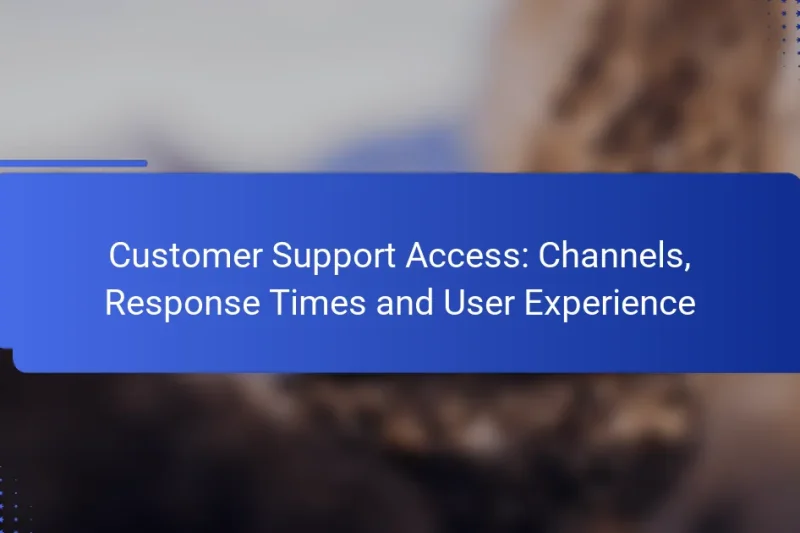Responsive customer service plays a crucial role in improving group collaboration and enhancing user experience. By … Responsive Customer Service: Impact on Group Collaboration and User ExperienceRead more
Group Management Software: Customer Support
Group management software plays a crucial role in enhancing customer support by facilitating efficient communication and collaboration among team members. Platforms like Monday.com, Asana, and Zoho Projects offer tailored features that streamline service processes, allowing support teams to respond to inquiries more effectively. When choosing the right software, it’s essential to focus on functionalities that improve communication, provide valuable insights, and integrate well with existing tools.
Help Resources: User Satisfaction, Accessibility and Effectiveness
Enhancing user satisfaction in SaaS tools involves implementing effective feedback mechanisms, personalization features, and regular updates … Help Resources: User Satisfaction, Accessibility and EffectivenessRead more
Customer Support Options: Remote Team Needs, Software Features and Responsiveness
For remote teams in the UK, a variety of customer support options are available to facilitate … Customer Support Options: Remote Team Needs, Software Features and ResponsivenessRead more
Customer Support Impact: User Retention, Satisfaction and Collaboration Success
Customer support is essential for enhancing user retention and satisfaction, particularly in SaaS companies where it … Customer Support Impact: User Retention, Satisfaction and Collaboration SuccessRead more
Community Forums: Engagement, Support Quality and User Feedback
Community forums play a vital role in enhancing user engagement by offering a space for interaction, … Community Forums: Engagement, Support Quality and User FeedbackRead more
Effective Support: Case Studies, User Experience and Transformation Outcomes
Effective support plays a crucial role in enhancing user experience within Software as a Service (SaaS) … Effective Support: Case Studies, User Experience and Transformation OutcomesRead more
Customer Support Access: Channels, Response Times and User Experience
Effective customer support is essential for enhancing user experience, and in the UK, customers can access … Customer Support Access: Channels, Response Times and User ExperienceRead more
What are the best group management software options for customer support in the UK?
Some of the top group management software options for customer support in the UK include Monday.com, Asana, Zoho Projects, Wrike, and Teamwork. Each of these platforms offers unique features tailored to enhance team collaboration and streamline customer service processes.
Monday.com
Monday.com is a highly customizable project management tool that allows teams to track customer support tasks effectively. Its visual interface helps users manage workflows, assign tasks, and monitor progress in real-time.
Consider using Monday.com if your team requires flexibility in task management and prefers a visual layout. The platform supports integrations with various tools, enhancing its functionality for customer support teams.
Asana
Asana is known for its user-friendly interface and robust task management features, making it suitable for customer support teams. It allows users to create projects, set deadlines, and assign tasks to team members, ensuring accountability.
For teams that prioritize communication, Asana offers comment sections within tasks, facilitating discussions directly related to customer inquiries. This can improve response times and overall service quality.
Zoho Projects
Zoho Projects provides comprehensive project management tools, including time tracking and reporting features, which are beneficial for customer support teams. It allows teams to collaborate on tasks and monitor project timelines effectively.
Utilizing Zoho Projects can help in managing customer support tickets and tracking the time spent on each inquiry. This insight can aid in identifying areas for improvement in service delivery.
Wrike
Wrike is a versatile project management platform that offers advanced features like Gantt charts and workload management, which are useful for customer support teams. It helps in visualizing project timelines and resource allocation.
Wrike’s real-time collaboration tools enable teams to work together efficiently, ensuring that customer issues are addressed promptly. Its reporting capabilities also allow for performance analysis and optimization of support processes.
Teamwork
Teamwork is designed specifically for collaborative project management, making it ideal for customer support teams. It includes features for task management, time tracking, and client collaboration, enhancing overall service delivery.
Using Teamwork can help streamline communication between team members and clients, ensuring that customer needs are met efficiently. Its integration with other tools can further enhance its utility in managing support tasks.
How does customer support improve with group management software?
Customer support improves with group management software by enabling more efficient communication, task management, and collaboration among team members. This software centralizes processes, allowing support teams to respond to inquiries faster and more effectively.
Streamlined communication
Group management software enhances communication by providing a centralized platform for all team members to interact. Features like chat, notifications, and shared updates ensure that everyone stays informed about customer issues and resolutions.
For example, using a tool that integrates messaging and ticketing can reduce response times significantly, allowing support agents to address customer concerns in real-time. This leads to higher customer satisfaction and loyalty.
Centralized task management
Centralized task management allows support teams to assign, track, and prioritize customer inquiries efficiently. With a clear overview of tasks, team members can focus on high-priority issues and ensure nothing falls through the cracks.
Implementing a system that categorizes tasks by urgency can help teams manage their workload effectively. For instance, using color-coded labels for different priority levels can quickly guide agents on where to focus their efforts.
Enhanced collaboration tools
Enhanced collaboration tools facilitate teamwork by allowing support agents to share resources, documents, and strategies easily. Features like shared dashboards and collaborative notes enable teams to work together seamlessly, even when remote.
Utilizing collaborative tools can lead to faster problem-solving. For example, if an agent encounters a complex issue, they can quickly consult with colleagues through shared platforms, reducing resolution times and improving overall service quality.
What features should I look for in group management software for customer support?
When selecting group management software for customer support, prioritize features that enhance communication, provide insights, and integrate seamlessly with existing tools. Key functionalities include real-time messaging, robust reporting and analytics, and strong integration capabilities to streamline support processes.
Real-time messaging
Real-time messaging is crucial for effective customer support, allowing team members to communicate instantly. Look for platforms that offer chat functionalities, enabling quick responses to customer inquiries and internal discussions. Features like message history and notifications can enhance team collaboration.
Consider tools that support both one-on-one and group chats, as well as the ability to share files and links easily. This ensures that all team members have access to the same information, reducing response times and improving customer satisfaction.
Reporting and analytics
Reporting and analytics features help you track customer support performance and identify areas for improvement. Choose software that provides customizable dashboards and reports on key metrics such as response times, ticket resolution rates, and customer satisfaction scores.
Regularly analyzing this data can help you make informed decisions about staffing, training, and process adjustments. Look for tools that allow you to export data for further analysis or integration with other business intelligence systems.
Integration capabilities
Integration capabilities are essential for ensuring that your group management software works well with other tools your team uses. Check for compatibility with customer relationship management (CRM) systems, email platforms, and project management tools to create a seamless workflow.
Prioritize software that offers APIs or built-in integrations, which can save time and reduce manual data entry. This connectivity allows for better data sharing across platforms, enhancing overall efficiency in customer support operations.
How can I evaluate group management software for customer support?
To evaluate group management software for customer support, focus on trial periods, user reviews, and feature comparisons. These elements provide insights into the software’s effectiveness, usability, and overall value for your organization.
Trial periods
Trial periods allow you to test the software before committing financially. Look for options that offer at least a two-week trial, as this gives you enough time to assess its functionality and integration with your existing systems.
During the trial, involve your support team to gather feedback on usability and performance. Ensure the software meets your specific needs, such as ticketing systems, chat support, or integration with other tools.
User reviews
User reviews provide real-world insights into the software’s strengths and weaknesses. Check platforms like G2, Capterra, or Trustpilot for comprehensive feedback from other users in similar industries.
Pay attention to comments about customer support responsiveness, ease of use, and any recurring issues. This information can help you gauge whether the software will meet your team’s expectations and requirements.
Feature comparisons
Conduct feature comparisons to identify which software best aligns with your customer support goals. Create a list of essential features such as multi-channel support, reporting capabilities, and automation tools.
Compare at least three different software options side by side, focusing on how each one addresses your specific needs. Consider factors like pricing, scalability, and the availability of integrations with other systems you use.
What are the pricing models for group management software in the UK?
Group management software in the UK typically offers several pricing models, including subscription-based, one-time purchase, and tiered pricing. These models cater to different organizational needs and budgets, allowing users to choose the most suitable option for their group management requirements.
Subscription-based pricing
Subscription-based pricing is a popular model for group management software, where users pay a recurring fee, often monthly or annually. This model provides access to ongoing updates, support, and new features, making it ideal for organizations that require continuous improvements and assistance.
Prices for subscription plans can vary widely, typically ranging from £10 to £100 per month per user, depending on the features and level of support included. Organizations should assess their needs to select a plan that balances cost with necessary functionalities.
One-time purchase pricing
One-time purchase pricing allows organizations to buy the software outright, providing a permanent license for use. This model can be cost-effective for groups that prefer not to commit to ongoing payments and have the resources for initial setup and maintenance.
However, users should consider potential costs for future upgrades and support, which may not be included. One-time purchases generally range from £500 to £5,000, depending on the software’s complexity and features.
Tiered pricing
Tiered pricing structures offer multiple levels of service at different price points, catering to various organizational sizes and needs. Each tier typically includes a set of features, with higher tiers providing more advanced functionalities and support options.
This model allows organizations to start with a basic plan and upgrade as their needs grow. Tiered pricing can range from £20 to £200 per month, depending on the selected tier and the number of users.
